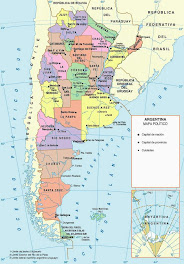After losing to Spain in the final of the 2008 Davis Cup in Mar del Plata, Argentina repeated the loss this last week when they were beaten by the Spaniards in Seville, an event which saw the home side win its fifth Davis Cup since 2000.
Rafa Nadal saw off Argentina’s Juan Martín Del Potro 1-6, 6-4, 6-1, 7-6 to give his country’s tennis fans something to sing and dance about in true Andalucian style.
Juan Martín del Potro and his team however, had not been without support during the competition and the Olympic stadium in Seville had its fair share of Argentines waving their blue and white flags and banging their drums.
Whenever Argentina participates in a sporting event in Spain, it can always count on a large presence of supporters, owing to the fact that Spain has a rather large Argentine population.
This year’s figures show that there are over 120,000 Argentines living in the Iberian nation. Many migrated there due to the Argentine financial crisis of 2001/2002. Between 2001 and 2011 there has been a 270% increase in Argentine migration to what for many is the country of their ancestors.
And it was those ancestors who years before made the same transition in the opposite direction.
The Spanish first arrived in Argentina in the sixteenth century, with Spain establishing a permanent settlement in what is now Buenos Aires in the year 1580. The territory became an ever more important element of the Spanish Empire when the Vice Royalty of Rio de la Plata was created in 1776.
But it was during the late nineteenth and early twentieth century that there was Spanish immigration to Argentina on a mass scale.
Between 1857 and 1960 it is estimated that 2.5 million Spaniards crossed the Atlantic and made Argentina their home. The first decade of the 1900s alone saw over 400,000 make the journey.
The vast majority, around 70% of those migrants, hailed from the north western Spanish community of Galicia. It is for this reason that Argentines today refer to all Spaniards as Gallegos (Galicians). A silly Gallego, normally called Manolo, is actually the butt of many Argentine jokes and stars as the silly Irishman in the modern day Argentine version of the English, Irishman, Scotsman jokes that are told in England.
But despite the fact that Buenos Aires has the second largest Galician population in the world, it is not a city that is in anyway particularly Spanish. There is no culture of bullfighting, the custom of nipping in out of the bars to drink una caña with tapas is not the done thing and you’d be hard pushed to find anyone eating tomato on toast for breakfast. The Spanish obsession with seafood is not something that is shared in Argentina, where the occasional serving of merluza is about the only contact the vast majority of porteños have with anything hailing from the ocean. And if you feel the craving for paella, pretty much your only chance would be a visit to one of the Spanish bars around Avenida de Mayo where they serve Argentine versions of old world dishes, probably as authentic as the restaurants which dish up Argentine grilled meat in Spain.
 |
| Argentine Davis Cup team |
The two countries however have a centuries old connection and it is clear that most Argentines feel very comfortable in Spain, and vice-versa. The sporting rivalry exists but it’s all in good spirits and most would accept that the Spanish enjoy the company of Argentines as much in their stadiums as in their country. Oh, and they really like the Argentine accent.









Hello my friend!!!
ReplyDeleteNext Argentinean match in the David Cup is with Alemania. Do you know where is it? In Bamberg, very very close to Nurnberg. I´ll be there.
Saludos !!!
Leandro
This comment has been removed by a blog administrator.
Delete